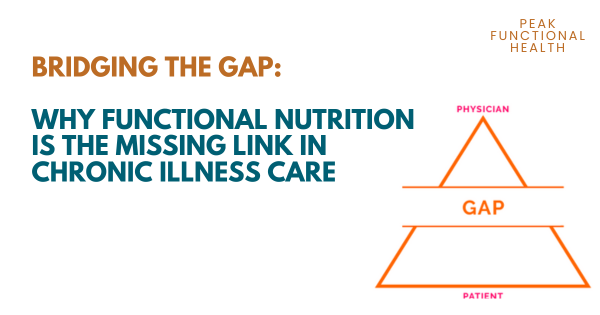Bridging the Gap: Why Functional Nutrition Is the Missing Link in Chronic Illness Care

The Gap in Modern Medicine
If you're living with a chronic condition—autoimmune disease, diabetes, digestive issues, or any number of “medically unexplained symptoms and diagnoses”—you may have already sensed it: there’s a gap in today’s healthcare system. A wide, frustrating, often lonely gap that leaves you stuck between diagnosis and resolution.
This isn’t just a feeling. It’s a structural flaw in the system—and one that’s only getting worse.
As a Functional Nutrition Counselor, I work in that in-between space—the gap between an overstretched medical system and you, the patient, who deserves personalized, one-on-one care. I help people who’ve seen the specialists, filled the prescriptions, followed the diets, tried the protocols… and still don’t feel better.
There’s a very real gap in the medical model—and it’s not limited to conventional allopathic care. It shows up in functional, holistic, and integrative approaches as well. There are simply too many people to help and not enough time to support each one in a way that addresses their unique terrain—the internal environment responsible for chronic dysfunction.
This gap is especially evident in the 20% of people with chronic illness who don’t respond to standardized care. These are individuals with big diagnoses and big struggles who have done everything right and still aren’t getting better.
If you've been told your symptoms are "just stress" or that "your labs are normal"—yet your body is clearly telling you otherwise—you’ve experienced this gap firsthand. You’re not broken. You’re navigating a system that isn’t designed to support deep, sustainable healing.
Why This Gap Exists
The Physician’s Role
Doctors are incredibly intelligent, well-trained, and essential to healthcare. But their training is primarily geared toward diagnosing and treating disease—not uncovering the root causes or daily influences behind why your body is struggling in the first place.
They typically don’t have the time—or in many cases, the training—to explore your diet, stress levels, gut health, or sleep patterns in depth. Medical school includes very little education on nutrition, lifestyle modification, or the role of daily habits in chronic illness. And the system itself isn’t set up to give doctors the time needed to go deeper. Modern medicine is expensive, and for many healthcare organizations, seeing (and billing) as many patients as possible is critical for survival.
And to be clear: doctors shouldn’t be expected to do it all.
The Patient’s Struggle
On the other side, you—the patient—are in the weeds. You’re dealing with daily symptoms, trying to make connections, manage your life, and piece together the puzzle of your own body. But without a guide, how are you supposed to know what to do next?
Most people don’t know how gut health affects their mood, or that blood sugar fluctuations might be driving inflammation. Many don’t even know where their stomach, pancreas, liver, or small intestine are—let alone what they do. And it’s daunting to try and figure it all out on your own.
The Systemic Disconnect
Chronic disease is complex and multifactorial. But the current medical system isn’t built to explore nuance. It’s designed to identify a diagnosis and move forward with a standardized protocol—one that might address symptoms temporarily but rarely leads to lasting change. The deeper question—why is this happening?—often goes unasked.
And even when you do get information about what’s going on, there’s often a major disconnect between knowing what to do and actually being able to do it. That’s where Functional Nutrition plays a vital role.
Functional Nutrition: Bridging the Gap
Functional Nutrition lives in that gap—and helps fill it. We're trained not just in physiology and systems thinking, but also in listening, empathy, and real-life behavior change.
At Peak Functional Health, we use tools like the Functional Medicine Matrix and the Functional Medicine Timeline to map out your unique history, triggers, patterns, and resilience factors so we can see the full picture—and support you in a personalized, practical way.
As described in the last article Your Body Is Speaking—Let It Guide You to Root Cause Resolution, we don’t throw darts at symptoms or put a lid on a boiling pot. We start by assessing the terrain of your body—the internal environment where your health challenges are taking root.
The amazing thing is, when we shift the terrain, the body begins to shift too.
I often compare the transitional shift to a rafter sitting in a delta where a freshwater river meets the ocean. As the raft drifts farther into saltwater, the likelihood of encountering sharks, jellyfish, and other threats increases. You could try to fight each threat directly—perhaps by harpooning a shark—but that’s dangerous, exhausting, and often ineffective. Even a hit might spill blood, drawing more predators.
But what if, instead of attacking, you started guiding the raft back toward freshwater—an environment where those threats can’t survive in the first place?
That’s the power of shifting the terrain where the roots of disease grow. It’s not about chasing symptoms individually. It’s about changing what’s underneath them so the symptoms naturally begin to resolve—from the inside out.
What makes Functional Nutrition different is the partnership. You’re not just a patient—you’re seen as a whole person. Together, we build your understanding of what’s happening in your body and why it’s responding the way it is. Then we take sustainable, thoughtful steps to help your body come back into balance—back from the salty water or the nutrient-poor soil where dysfunction thrives.
Stay in touch!
Subscribe to our newsletter for periodic updates, special offers, and education!
Thank you for subscribing!
Have a great day!